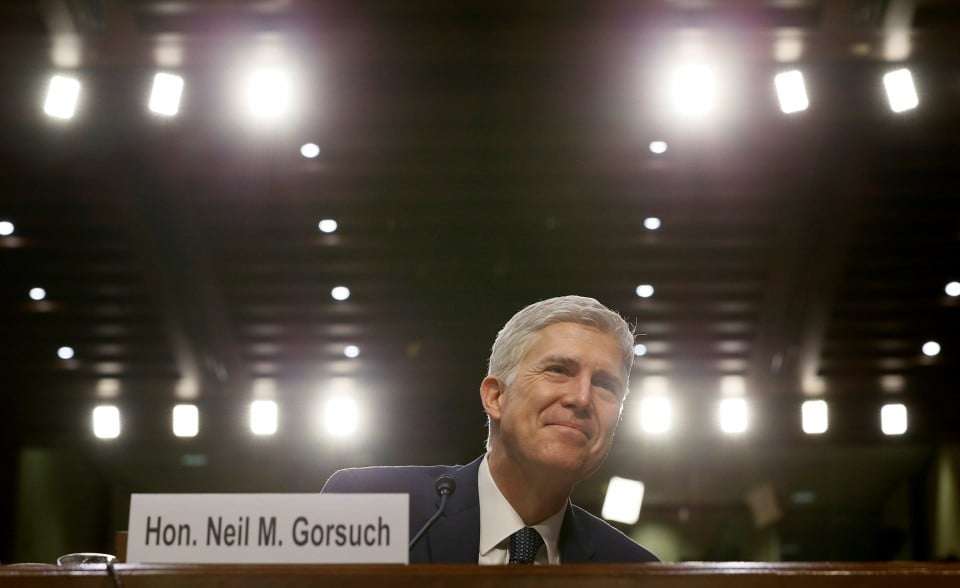The Volokh Conspiracy
Mostly law professors | Sometimes contrarian | Often libertarian | Always independent
Grilling Gorsuch and fearing the Federalist Society

This week, Senate Democrats have poked and prodded Judge Neil Gorsuch in an effort to derail his confirmation to the U.S. Supreme Court. They've asked about his judicial opinions, his writings, his work for the George W. Bush administration, and even his dissertation adviser. Throughout it all, Gorsuch has been largely unflappable, revealing that he is precisely what all who know him already knew: He's an intelligent and conscientious, mainstream conservative judge who cares deeply about the judicial craft.
Not content to let the Gorsuch nomination sail through, some have sought to suggest he's unfit because of who nominated him or who supports him. Sen. Sheldon Whitehouse (D-R.I.), for one, spent time challenging Gorsuch to disavow the "dark money" supporting his confirmation. Others have expressed dismay that Gorsuch is a member of the Federalist Society and was recommended to the president by the Society's executive vice president, Leonard Leo, who has taken a leave from the organization to work on the nomination.
"Neil Gorsuch Was Hatched in a Federalist Society Lab," proclaims Dahlia Lithwick's latest article for Slate. "We Must Filibuster Gorsuch's Federalist Society Agenda," screams an op-ed circulated on progressive websites. Repeating what have become common progressive talking points, the author portrays the Society as a secretive cabal advancing a sinister, "pro-corporate, anti-civil rights agenda."
As a longtime member and supporter of the Federalist Society, I recognize very little in the dark caricatures drawn by progressive politicians and pundits. The Federalist Society - to which I've belonged and contributed for many years - is certainly a right-of-center organization, but its focus is on ideas, not supporting specific causes or interests. It is, as its statement of purpose, indicates
a group of conservatives and libertarians interested in the current state of the legal order. It is founded on the principles that the state exists to preserve freedom, that the separation of governmental powers is central to our Constitution, and that it is emphatically the province and duty of the judiciary to say what the law is, not what it should be.
The idea of a narrow Federalist Society "agenda" is particularly bemusing, though I suppose it's easy to fear and misrepresent what one doesn't understand. While the Society is united by broad principles, its members have a wide range of views on the particulars.
I first encountered the Society as an undergraduate, when the group was hosting its annual symposium at Yale. I showed up to hear an engaging and highly substantive debate over the Supreme Court's then-recent decision in Employment Division v. Smith. From that moment, I was hooked.
Since then I've observed (and often participated in) debates among members on the scope of the Commerce Clause, the nature of judicial review, the need for the Religious Freedom Restoration Act, the constitutionality of affirmative action, taxpayer standing, the scope of federal preemption, habeas rights for detainees, and many other issues.
Some Federalist Society members were at the forefront of developing challenges to the Affordable Care Act, while others were convinced of its constitutionality. Some Federalist Society members inveighed against the unconstitutionality of President Barack Obama's immigration reforms, while others of us defended their legality. Some Federalist Society members defended the constitutionality of the Defense of Marriage Act, while others of us argued it was an improper use of federal power. Some Federalist Society members believe Kelo v. New London epitomizes government tyranny, while others of us believe it is consistent with the text of the Fifth Amendment. And so on.
Federalist Society luminaries range from libertarians like Randy Barnett to traditionalists like Michael Stokes Paulsen and those who defy conventional definition, like Society Chairman Steven Calabresi, a noted originalist scholar who's also written that the Constitution requires recognition of same-sex marriage. The Federalist Society has celebrated the work of the late justice Antonin Scalia, whose legacy was the focus of last year's annual convention, while also praising the academic work of liberal scholars such as Akhil Reed Amar, who was awarded the Society's Paul M. Bator prize in 1993.
When sponsoring programs on law school campuses (in which I often participate), the organization goes out of its way to encourage discourse and debate. (Alas, at many schools it can be difficult to find professors who are willing to exchange views in front of students.) Federalist Society conferences - and the student symposia in particular - feature diverse panels and pointed debates on the most important legal issues, with opinions spanning the political spectrum. Few, if any, organizations can claim equivalent programming. It's no wonder that Justice Elena Kagan proclaimed "I Love the Federalist Society" when she was Harvard Law's dean.
It's certainly true Gorsuch has been involved with the Society. In 2013, he delivered the Barbara Olson Memorial Lecture at the annual lawyers convention. But if Judge Neil Gorsuch is a "product" of the Federalist Society, this is shown less in the results he reaches than how he gets there. His intellectual engagement and careful reasoning are more a hallmark of the group than the holding of any particular case. He wants to get the law right, not ensure his favored side wins. That, above anything else, is why some of us support him. Alas, it appears that may be why some oppose him.


Show Comments (0)